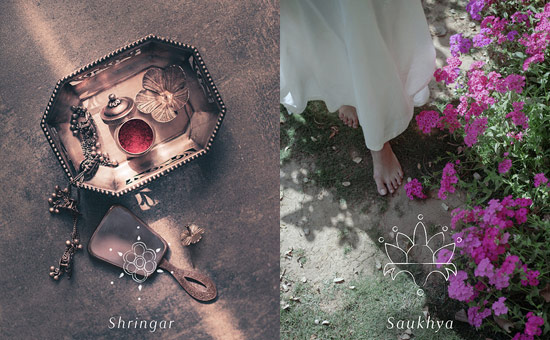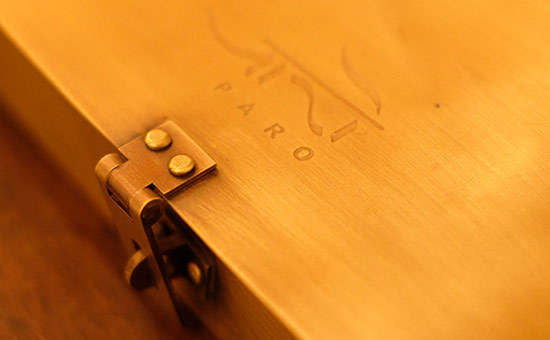- In her quest for mindful living, the co-founder of Nicobar immersed herself in a deeper understanding of ancient Indian wisdom and philosophy.
- Lal’s desire to share her experience with people led her to launch Paro, an experiential concept space in Delhi based on the idea of holistic beauty.
I find myself in an idyllic campus called the
Vedanta Academy, outside Pune, where we all wake up at 4am, study, then
practise a few hours of yoga, followed by sports and lectures on Vedanta
philosophy. It is almost spartan, but well thought through. I am in a small
room with so little around me, and it strikes me that this is truly all one
needs for inner happiness.
How did I get here? Around five years ago, on a family holiday in Germany, I asked my father, Vikram Lal, a question: “Pa, if you could choose to be born in any country in the world and everything remains the same—your family, work, etc., which country would that be?" He closed his eyes, only opening them around half an hour later and saying, “I have finally concluded that the only country I would like to be born again in is India." I was quite surprised with this response because my father spent a formative part of his life in Germany before he founded Eicher Motors, and keeps going back. We all have grown up highly influenced by Europe and I assumed he would mention one of those countries.
When I asked him why, he said, “Because the level of sophistication of ancient Indian thought, the nuanced philosophy, heritage of its wisdom along with its richness of culture, craftsmanship and diversity is what shapes me. Everything else feels quite flat in comparison."
That got me thinking. I have always considered
myself someone who is rooted in India and is deeply appreciative of our
heritage. But I hadn’t spent much time getting to know our philosophical
thought.
I lead a rather hectic life—I ran (lifestyle brand)
Good Earth for many years, then my husband and I started Nicobar, and, most
recently, I launched Paro. I have two young boys and as someone recently told
me, this truly is the rush hour of one’s life—with so many different priorities
to juggle, all at the same time. Till around two-and-a-half-years ago, I had
been squeezing myself dry and not giving back to myself or nourishing my body
or soul. I was constantly irritable and on edge.
Every so often, that conversation with my father
would float in and out of my head. I started wondering about how I relate to
the larger world; I started looking for connections between the mind, body and
soul. That was my first moment of pause.
I picked up a book called Absolute Beauty by Pratima Raichur, a book that has been with me for over 20 years. But when I read it this time, it opened up a whole new world for me. It is a book based on Ayurvedic principles and explains how external skin tissue is a reflection of everything that happens within our body: the way we eat and breathe, as well as the thoughts and emotions that fill our mind and colour our spirit. She says: “How we view the world and how we feel about things affects our experience, and experience changes the body. When modern medicine asks where the body is diseased but not why the patient is ill, it ignores the basic truth of our experience. Most disease results from a breakdown in the immune system; immune breakdown results from stress; stress is due to perception; and perception derives from consciousness."
I was deeply curious about what she called “consciousness" and how that pervades everything. I joined a short online course at Oxford University on the philosophy of yoga and that gave me an overview of different philosophical thoughts. I bought The Yoga-Sutra of Patanjali by Chip Hartranft—this one came highly recommended by my friend, Veer Singh, founder of the wellness destination Vana, near Dehradun. It took me deeper into the philosophical aspects of the yoga tradition. I also went through the bibliographies in all these books and bought those that piqued my interest. I re-read Cosmos by Carl Sagan. And, finally, another friend and colleague, Pareina Thapar, recommended the Vedanta Treatise by A. Parthasarathy. It is this book that made a huge impact on me.
Parthasarathy emphasizes that the Vedanta
philosophy is a guide for daily living and says:
“Living is an art, a skill, a technique. You need to learn and practice it as you would to play a musical instrument or fly an aircraft."
It is a whole new perspective on life, from our own
country. It encourages questioning and experimentation. I always thought of
anything to do with our historic texts as something religious and emphasizing
faith vs. rationality. To my surprise, Vedanta made me look deeper into the
nature of things, and, very importantly, the nature of the self through
observation and questions.
The main tenets of Vedanta, as I understand them,
are a reflective study of yourself (to eventually join with your higher
self-consciousness).
To quote Parthasarathy again, “It is not the world that distresses you but how you relate to it."
 Shringar means inner and outer beauty. Saukhya is deep comfort and well-being.
Shringar means inner and outer beauty. Saukhya is deep comfort and well-being.
Another main tenet is the deep connect with, and reverence for, nature. Which means being in sync with the rhythms of nature. I realized that something as basic as being connected to nature, prakriti, expressed through the rhythms of seasons and lunar cycle, is something that we urban Indians are increasingly removed from.
I started creating little daily rituals for myself to be more connected with the rhythms of nature, like going up to my terrace early in the mornings and bowing to the rising sun. It’s amazing what a change that has made: I started noticing the different types of birds that perch regularly on my terrace, I was more aware of the hue of the sun in winter (hemanta) vs spring (basant) vs summer (grishma), the deep fragrance of the mogra at sunrise vs later in the day.
I also started fasting between seasons, an old Indian tradition. This ritual of fasting is like a bridge between seasons, it is a pause: a moment to reflect, acknowledge the transition between seasons, a time to give your body and even the mind a break from the daily routine. I realized I was falling ill much less and feeling a lot more energetic.
That moment of pause, when we take in a deep
breath, in that very moment we have a choice to see things for what they truly
are: to readjust our perception, to respond rather than react. And that little
moment of pause, if done mindfully and regularly, can be, and has been, life
changing for me.
 Paro means the sharing of special knowledge. The logo is hand drawn in Devanagari script.
Paro means the sharing of special knowledge. The logo is hand drawn in Devanagari script.
For me, it has been so powerful that I felt the
deep desire to share this experience with people who may benefit. It is why I
launched Paro (which in Sanskrit
means the sharing of special knowledge), an offering for anyone who is intrigued
and curious about this holistic approach to well-being.
Paro, which I intend to restrict to one space in
Delhi’s Chanakya Mall, is an experiential concept space based on the idea of
holistic beauty, which we define as inner and outer beauty (shringar)
and deep comfort and well-being (saukhya). It has been quite a challenge
because it is not a typical store. It leads with experience and sometimes
leaves people with more questions than answers.
The idea is to give people the tools to create
personal rituals of saukhya and shringar through
workshops in our Shanti Space, a library of books that I have personally read
and loved, special treatment rooms, the Botanica space built like an apothecary
where an aroma therapist personalizes and blends the purest oils, and more.
I hope it will nudge people on to a journey, their
own journey, that incorporates precious moments of pause.
Simran Lal is the CEO of Good Earth and co-founder of Nicobar and Paro.
Article first published in
LOUNGE here.
eSamskriti has obtained permission from LOUNGE to share.
Also read
1 Patanjali’s Yoga Sutras